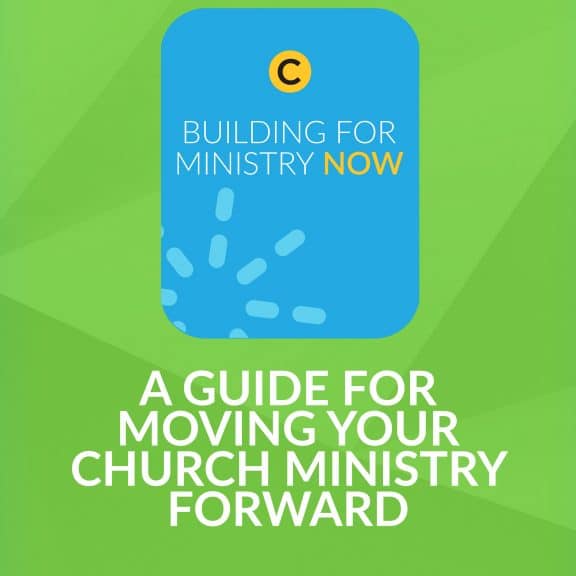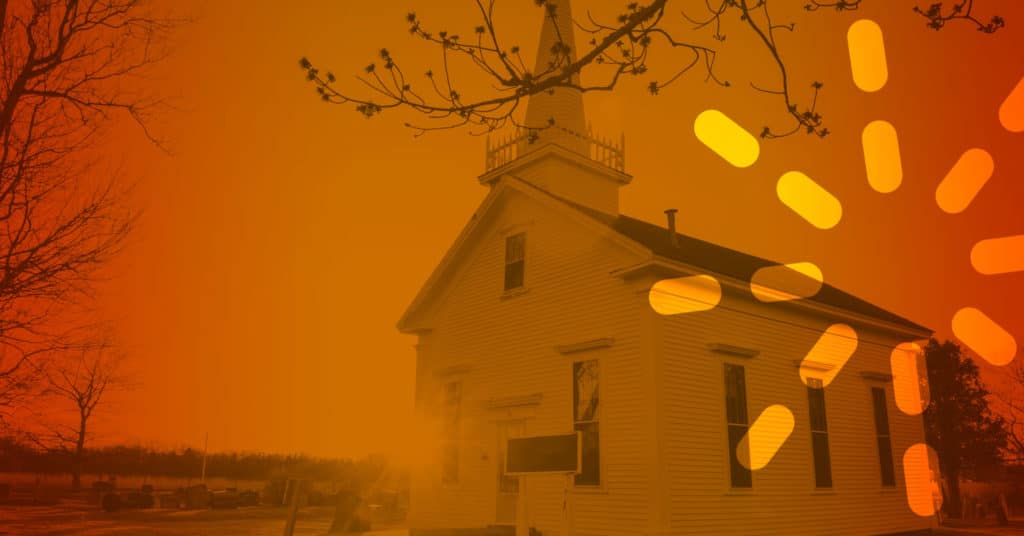If you prioritize children’s faith formation, you will grow.
Faith formation and the role of the church as a whole is a really big topic. This is generational, across the church. So, as we think about prioritizing children’s faith formation and involving the church as a whole, here’s what I would tell you:
If you prioritize children’s faith formation, you will grow. Also, the whole church will grow.
We have this misconception that, somehow, there’s only one way—from adults to children—that faith formation happens. But let me let you in on a secret: For those who invest in faith formation of children, their faith grows too.
It’s a reciprocal process. Children teach us about God. Children give us a lens into understanding God in fresh, new ways. And I think it’s not only parents and volunteers in the church who need to have that lens, but the whole church needs to be open to their faith growing and being formed as they interact with children.
The Importance of Bible Reading in Faith Formation
We need to showcase the importance of personal Bible reading to connect with God and experience the wonder of who He is. I love this.
Why is this important, and how can we do it?
Why? The basic reality is we cannot give away what we do not have. Adults, parents, grandparents, guardians, aunties, uncles, volunteers, nor the average person who walks through the halls of the church. Put simply, no one can give what they do not have.
Children bump into us all the time. That’s the nature of childhood. It happens in the home, it happens in children’s ministry, it happens in the hallways of the church, it happens in the cafe of the church as you’re coming into church. Children are always bumping into adults both figuratively and literally.
What Splashes Out?
When a child bumps into you, what splashes out of you into the life of that child?
What are you so filled up with that when a child bumps into you, that’s what splashes out? Are you so filled up with frustration, busyness, worry, impatience, anger, despair? Is that what spills out of you into the life of a child?
Or have you been tending your own spiritual journey through personal Bible reading and prayer, through connecting in the community of faith through all the spiritual disciplines? Have you attended to your own spiritual journey so that when—not if, but when—a child bumps into you, what will splash out onto them is the fruit of the spirit?
Is what you were reading in Scripture or listening to in a song that morning coming out?
This past weekend we had our kids for an overnight, and my seven-year-old granddaughter kept singing a worship song. She had heard it last Sunday sitting next to me in church, so I took a little video of it for her and sent it to the worship team to tell them thank you for planting seeds of faith.
I called the video praises and puzzles because she was putting together a puzzle and singing this praise song all on her own. Nobody said to her, “Hazel, now you learn this. You learn this worship song so that when you’re doing puzzles you can praise God.” There was nothing explicit like that. She just was in an environment of worship. It impacted her, and she sang that song over and over and over again this weekend.
It’s because she had been splashed with faith.
So, what is it that you filled yourself up with?
When a child bumps into you, what splashes out of you into the life of that child?

Fill Yourself Up
I would say you need to fill yourself up with the reading of Scripture. You need to fill yourself up with spiritual community, faith, worship, and acts of service. So that what splashes out of you onto the life of a child, and into the life of that child, are those things rather than things that we may not want to be inadvertently splashing out onto a child.
So that’s the why, because we’re going to be bumped and we cannot give away what we don’t have.
How do we do this?
I think the faith formation guide (available at the end of this article) gives you some really good suggestions like a whole-church Bible reading plan.
A few years ago, our church invited the whole congregation to read through the Scripture in a year and to do it together. You might want to create a unique reading plan for a special season of the year.
Now I can just hear some of you saying, “But, Denise, I do not have that kind of influence in the church.” I get it. As a children’s ministry, family ministry, or youth ministry leader, you don’t necessarily, have the influence to set a Bible reading plan script for the church as a whole.
But what you can do is influence the group you do have responsibility for. So what if you said to your teachers and volunteers, “Hey, let’s read this together.”
Rather than bemoaning the fact that you don’t have influence for the whole, go where you do have influence. I’m quite confident that you have influence. Invite your parents and grandparents to be a part of this influence where you can help people focus on Scripture reading. We know that it is transformative. It is God’s divine truth.


Teach About the Bible
We also need to teach about the Bible. Churches today cannot assume that adult attenders or even key volunteers know why we value Scripture as a source of divine truth. That’s true in culture as a whole.
The Bible is seen by some as a dusty textbook that is studied in Bible colleges or churches that are no longer connected to faith. We need to help the people who walk through our doors and those who we have influence over to understand that we can trust Scripture; it’s reliable, valid, and trustworthy.
If we are going to spend time encouraging people to read the Bible, we need to make sure they understand the validity and the reliability of the Bible.
So how do we do this?
This is probably something we haven’t thought of before, but what if in your teacher training for children’s ministry leaders, you not only taught them policies and procedures—safety and security, how to connect with parents, emergency evacuation policies, training on how to use trauma-informed practices in your children’s ministry—but what if you also included a unit in your children’s ministry teacher training that was related to helping people understand the validity and reliability of Scripture.
Questions
- How were the books of the Bible selected, and why were some books left out?
- Why are there different versions of the Bible?
- How do we know that the Bible’s human authors are credible?
- And how do we know that the Bible we have today is what they originally wrote? Did it come through the ages? And can we trust that the text that we have today is the text that was intended?
- How do we handle what seem to be contradictions in the Bible?
- What tools can help us understand the different genres, the different types of writing in the Bible, such as historical narrative, poetry, parables, letters, all of the different genres of Scripture?
So whatever communication channels you have with teachers, infuse those with a Bible reading suggestion a Bible reading invitation. Don’t make it a heavy thing but invite them along in the journey and then answer some of these questions in the process.
You can answer all these questions through teacher training. And I must just say the days of teachers coming to an all-day training session are gone. We’re now doing webinars and short segments of training.
You can do the same thing with parents. Share these truths with parents. Why should they study the Bible with their kids if they don’t think the Bible is divine truth with transformational power? If they don’t understand that, if they don’t believe that, if they have questions about that, that’s an amazing invitation for us to walk in and have a conversation.
Talk About It
I encourage you to ask your pastor or your adult discipleship leader to offer a small group where they talk about these questions.
Wherever you can influence the top leadership, do that, but don’t get discouraged. Instead, take the place where you do have influence and incorporate these concepts into those places.
Have Open Dialogue
Invite open dialogue about doubts and questions.
Skeptics and new believers will have questions, and so will regular church attenders and key volunteers.
And what about us as leaders? Do we have safe places to explore what we’re wrestling with? Let’s not be afraid to take an honest look at hard questions about God, the Bible, and faith.
Why is open dialogue important?
If we are afraid of questions and doubts, it communicates that our faith cannot stand up to scrutiny. We need to somehow communicate that we have a culture of curiosity. This a culture of asking questions, a culture where it’s okay to say, I’m not sure if I believe that. And no one will gasp in disbelief.
They will instead respond openly to continue the conversation. Tell me more about that. Help me understand where you’re coming from. That’s interesting. A culture of curiosity is more inviting than a culture that shuts people down and shuts them up and eventually accompanies them out of the church.
We need to believe the Bible can stand up to questions. We need to believe that our God is big enough to handle the questions and the doubts. And we can’t let ourselves feel threatened by the deconstruction that’s happening of faith for a lot of people.
We just need to walk alongside people in that process and invite dialogue, invite conversation, invite relationship. Because without relationship, people don’t feel safe to ask their questions or share their doubts.
How in the world do we do this?
Maybe we feature a question of the week that people have the opportunity to submit anonymously. You can respond to them in your adult gatherings, via email, in your Facebook posts, or anywhere you have avenues of response. Again, little nuggets that invite ongoing conversation are what we’re going for here.
And if someone asks you a question that you have no idea how to answer, that’s exciting. It can help you grow your relationship when you don’t know, and you work together to find the answer.
Luther Seminary did a study called The Exemplary Youth Ministry Study. They were looking for what it is that makes up exemplary youth ministry. They anticipated it would be a person, a place, or a program. And they thought it would be the coolest, most up-to-date youth pastor, or the most technologically superior space or even using the right curriculum or having the right elements present in the program.

The Spirit of Youth Ministry
And you know what they found out? It was not a person, it was not a place, it was not a program. It was the spirit of youth ministry that permeated the church. That’s what created an exemplary youth ministry.
So there was a spirit and a culture in the church that affirmed youth ministry. This was a culture that valued the youth and their contribution to the church.
I believe these concepts are transferrable to children’s ministry. So what does it take to have an exemplary children’s ministry? It takes the church as a whole. It takes the whole church giving energy to developing this spirit of children’s ministry that’s woven throughout our churches where children’s ministry is affirmed and where faith can be formed.
Three types of education can help us understand this a little bit more. There’s informal, non-formal, and formal education.
So what does it take to have an exemplary children’s ministry? It takes the church as a whole.
Formal Education
Well, let’s start with formal education. That’s probably what we’re most familiar with. We don’t do a lot of formal education in the church. Formal education is where there’s an outside accrediting body that looks at what we’re doing in education, endorses it, and recognizes the certificate or degree that’s given at the end of it. So think about the places we might do this in. Church is like a Christian school that is giving a degree at the end that is recognized by Bethel College when they come to Bethel University, right?
Or it might be a homeschool network within your church that gets together as a co-op and works together to have strong homeschooling. So that’s the formal piece. Most of us don’t participate in those pieces.
Informal and Non-Formal Education in Faith Formation
Where we exist is the non-formal and informal. Non-formal education is everything that we do in children’s ministry. It’s where there’s a curriculum, there’s a plan, there are relationships, but there is no outside accrediting body.
When your children go from children’s ministry to youth ministry, they don’t get a certificate that their parents hang on the wall that’s acknowledged and valued by the world as a whole. It’s non-formal, still very structured, still curriculum served, still intentional.
But here’s the one that we miss a lot, and it’s where I think it really makes a difference in terms of the church as a whole. Informal education. Informal education is the socialization, it’s the interactions, it’s the relationships, it’s the culture, it’s the spirit. That communicates a great deal to children.
And when we think about informal education in the church, it’s all of these things about valuing children. It’s about having place for children, celebrating children, and celebrating those who serve them.
Informal education is the most powerful component in faith formation. And it’s what we can’t structure. We can’t provide a curriculum or start a program to make it happen, but we need to pay attention to it and be intentional about it.
Teachable Moments
So, we need to look for teachable moments. We need to pair the informal and the non-formal if we want the church to be functioning at its best in the faith formation of children.
First of all, notice children. And secondly, value children.
A recent study done by Barna and Awana said that 56% of children’s ministry leaders believe that children’s ministry is forgotten.
So, what would it look like to remember? To get people to notice children? We need to get children or children’s ministry in front of the congregation on a regular basis. There’s a variety of ways you can do this.
- Fifth Sundays to have intergenerational worship together, serving together.
- Regular intergenerational worship together before the lesson or sermon.
- Share a slideshow, presentation, or announcement of what’s happening in children’s ministry.
- Share testimonials from those who are serving—how maybe their life has been changed by a child.
- Display children’s art in the foyer.
- Encourage church attenders to pray for the children at your church.

Value Children
I want you to help your church value children. And there are three things you can look at here.
- You can look at space.
- You can look at finances.
- And you can look at personnel.
Space
The whole church invests in the faith formation of children by valuing them through the space that’s provided for them.
If I walked into your church and looked at the children’s ministry space, what would I learn about your church’s value of children? Do children have prime space, or do they have leftover, undesirable space?
What does space communicate about the faith formation of children in your church as a whole?
Finances
What does your church budget reveal about the value of children? Is there money appropriately allocated for the disciple of discipleship of children in terms of curriculum or teacher training or salaries, like fair payment of staff who serve the children in the congregation?
It’s really important to look at finances.
Personnel
We need our best and our brightest in children’s ministry. And that’s you. I believe you are the best and the brightest. That’s who God calls into children’s ministry. We need our best Bible teachers, our best theologians, our best discipleship makers, and our best mentors serving in children’s ministry.
And why is this important? Because we know that if you teach a child something, if you are in relationship with them in some way, they will believe or experience whatever you say or do, and they won’t question it.
So we need to make sure that we are teaching good theology, that we are building sound biblical understanding, that we are mentoring well, and that we are valuing the discipleship process that will lead to a lifetime of following Jesus. This is all so that when they move into youth or young adulthood and they begin to say, Hmm, I’m not so sure about that, they will have had a strong foundation of relationship and teaching by the best and the brightest.
If you teach them poorly, if you mentor them badly, if you harm the relationship, if you disciple them inadequately, it will stick.
Ministry To, For, and With Children
Think about ministry to children, and that’s where we become an advocate, where we place ourselves between the children and the forces of evil. The forces of evil in our communities, the forces of evil in our neighborhoods.
We stand between those forces of evil and the children, and we advocate for them. We place ourselves between the children and the things that are coming up against them.
And, finally, we need to minister with children. We need to link arms with children, come alongside them. When we link arms, we are in position to minister with children and we empower them to be a part of the process of disciple making.
So let me just invite you to consider ministry to, for, and with children as we think about the responsibility of the church as a whole.
Download What If We’re Failing Kids at Faith Formation? And How Not To
This faith formation guide shares our desire to invite kids, parents, and volunteers into a Gospel-centered journey of curiosity, belief, faith, and identity.








